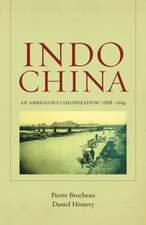Redefining the Egyptian Nation, 1930–1945: Cambridge Middle East Studies, cartea 2
Autor Israel Gershoni, James P. Jankowskien Limba Engleză Paperback – 7 aug 2002
| Toate formatele și edițiile | Preț | Express |
|---|---|---|
| Paperback (1) | 394.50 lei 43-57 zile | |
| Cambridge University Press – 7 aug 2002 | 394.50 lei 43-57 zile | |
| Hardback (1) | 683.08 lei 43-57 zile | |
| Cambridge University Press – 19 apr 1995 | 683.08 lei 43-57 zile |
Din seria Cambridge Middle East Studies
-
 Preț: 267.61 lei
Preț: 267.61 lei -
 Preț: 229.88 lei
Preț: 229.88 lei -
 Preț: 291.15 lei
Preț: 291.15 lei -
 Preț: 161.23 lei
Preț: 161.23 lei -
 Preț: 186.71 lei
Preț: 186.71 lei -
 Preț: 384.47 lei
Preț: 384.47 lei -
 Preț: 186.71 lei
Preț: 186.71 lei -
 Preț: 199.05 lei
Preț: 199.05 lei -
 Preț: 158.77 lei
Preț: 158.77 lei -
 Preț: 185.02 lei
Preț: 185.02 lei -
 Preț: 291.68 lei
Preț: 291.68 lei - 9%
 Preț: 628.34 lei
Preț: 628.34 lei - 8%
 Preț: 530.54 lei
Preț: 530.54 lei -
 Preț: 289.24 lei
Preț: 289.24 lei -
 Preț: 238.72 lei
Preț: 238.72 lei -
 Preț: 227.12 lei
Preț: 227.12 lei -
 Preț: 252.21 lei
Preț: 252.21 lei -
 Preț: 211.40 lei
Preț: 211.40 lei -
 Preț: 240.63 lei
Preț: 240.63 lei -
 Preț: 297.53 lei
Preț: 297.53 lei - 11%
 Preț: 581.66 lei
Preț: 581.66 lei - 11%
 Preț: 636.52 lei
Preț: 636.52 lei -
 Preț: 430.38 lei
Preț: 430.38 lei -
 Preț: 419.19 lei
Preț: 419.19 lei -
 Preț: 432.67 lei
Preț: 432.67 lei -
 Preț: 284.39 lei
Preț: 284.39 lei -
 Preț: 294.90 lei
Preț: 294.90 lei -
 Preț: 278.34 lei
Preț: 278.34 lei -
 Preț: 325.50 lei
Preț: 325.50 lei -
 Preț: 283.25 lei
Preț: 283.25 lei -
 Preț: 206.39 lei
Preț: 206.39 lei -
 Preț: 252.03 lei
Preț: 252.03 lei
Preț: 394.50 lei
Nou
Puncte Express: 592
Preț estimativ în valută:
75.49€ • 78.34$ • 63.10£
75.49€ • 78.34$ • 63.10£
Carte tipărită la comandă
Livrare economică 17-31 martie
Preluare comenzi: 021 569.72.76
Specificații
ISBN-13: 9780521523301
ISBN-10: 0521523303
Pagini: 300
Ilustrații: 2 b/w illus.
Dimensiuni: 153 x 230 x 20 mm
Greutate: 0.45 kg
Editura: Cambridge University Press
Colecția Cambridge University Press
Seria Cambridge Middle East Studies
Locul publicării:Cambridge, United Kingdom
ISBN-10: 0521523303
Pagini: 300
Ilustrații: 2 b/w illus.
Dimensiuni: 153 x 230 x 20 mm
Greutate: 0.45 kg
Editura: Cambridge University Press
Colecția Cambridge University Press
Seria Cambridge Middle East Studies
Locul publicării:Cambridge, United Kingdom
Cuprins
1. The roots of supra-Egyptian nationalism in modern Egypt; Part I. The Intellectual Formulation and Social Dissemination of New Supra-Egyptian Orientations and Ideologies: 2. 'Now is the turn of the East': Egyptian Easternism in the 1930s; 3. 'The return of Islam': the new Islamic mood in Egypt; 4. Egyptian Islamic nationalism; 5. Integral Egyptian nationalism; 6. Egyptian Arab nationalism; Part II. Supra-Egyptianism in Egyptian Politics: 7. Egypt, Arab alliance, and Islamic Caliphate, 1936–1939; 8. Palestine, public opinion, and Egyptian policy, 1936–1939; 9. The road to the Arab League, 1939–1945; l0. Conclusion: from Egyptian territorial to supra-Egyptian nationalism.
Recenzii
"...a sophisticated, massively researched, and remarkable original study of Egypt in the 1930's and early 1940's from which all students of modern history can benefit." American Historical Review
"...this is a very well written book, theoretically well-informed, with a distinguished conceptual clarity supported by empirical evidence." Digest of Middle East Studies
"Gershoni and Jankowski find gold in the periodicals and books of the time; through extensive reading, they succeed in providing, as they call it, "an essay in Egyptian self-understanding." Middle-East Quarterly
"...a useful work for anyone interested in the military history of the Middle East." The NYMAS Newsletter
"...this is a well-organized and coherently argued study." Briton C. Busch, Canadian Review of Studies in Nationalism
"...this is a very well written book, theoretically well-informed, with a distinguished conceptual clarity supported by empirical evidence." Digest of Middle East Studies
"Gershoni and Jankowski find gold in the periodicals and books of the time; through extensive reading, they succeed in providing, as they call it, "an essay in Egyptian self-understanding." Middle-East Quarterly
"...a useful work for anyone interested in the military history of the Middle East." The NYMAS Newsletter
"...this is a well-organized and coherently argued study." Briton C. Busch, Canadian Review of Studies in Nationalism
Descriere
The emergence of nationalism redefined Egyptian identity. This book shows how the growth of an urban middle class, combined with political failures in the 1930s, eroded the earlier territorial and isolationist order.















